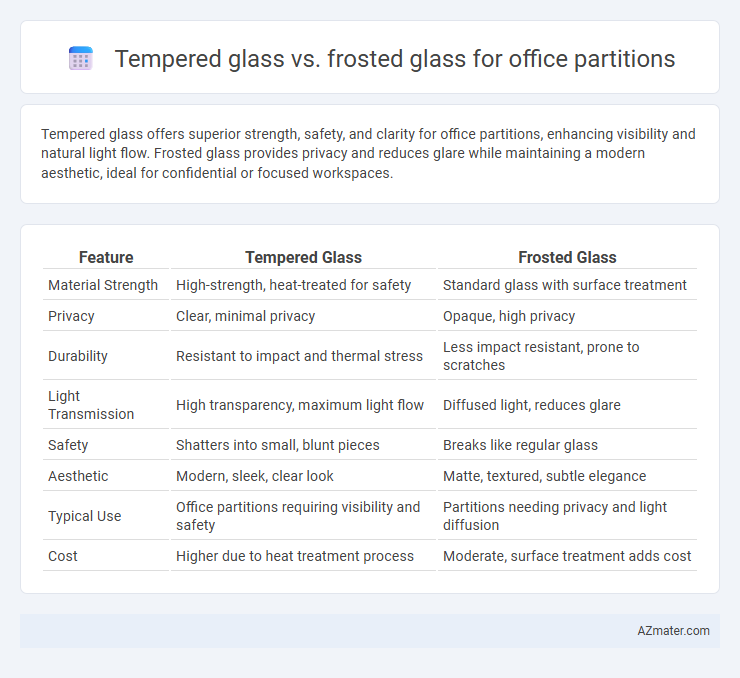Tempered glass offers superior strength, safety, and clarity for office partitions, enhancing visibility and natural light flow. Frosted glass provides privacy and reduces glare while maintaining a modern aesthetic, ideal for confidential or focused workspaces.
Table of Comparison
| Feature | Tempered Glass | Frosted Glass |
|---|---|---|
| Material Strength | High-strength, heat-treated for safety | Standard glass with surface treatment |
| Privacy | Clear, minimal privacy | Opaque, high privacy |
| Durability | Resistant to impact and thermal stress | Less impact resistant, prone to scratches |
| Light Transmission | High transparency, maximum light flow | Diffused light, reduces glare |
| Safety | Shatters into small, blunt pieces | Breaks like regular glass |
| Aesthetic | Modern, sleek, clear look | Matte, textured, subtle elegance |
| Typical Use | Office partitions requiring visibility and safety | Partitions needing privacy and light diffusion |
| Cost | Higher due to heat treatment process | Moderate, surface treatment adds cost |
Introduction to Office Partition Materials
Tempered glass offers high strength and safety features, making it ideal for office partitions that require durability and clear visibility to maximize natural light. Frosted glass provides privacy while still allowing diffused light to pass through, creating a softer, more private workspace atmosphere. Choosing between tempered and frosted glass depends on the balance between transparency and privacy needs in modern office design.
What is Tempered Glass?
Tempered glass is a type of safety glass processed by controlled thermal or chemical treatments to increase its strength compared to normal glass, making it ideal for office partitions due to its durability and resistance to impacts. It shatters into small, blunt pieces upon breakage, reducing injury risks and enhancing workplace safety. Often chosen for modern office designs, tempered glass provides clear visibility and allows natural light flow while maintaining structural integrity.
What is Frosted Glass?
Frosted glass is a type of glass that has been sandblasted or acid-etched to create a translucent, matte finish, providing privacy while allowing light to pass through. It is commonly used in office partitions to reduce glare and maintain an open, bright environment without compromising confidentiality. Unlike clear tempered glass, frosted glass offers enhanced privacy and a softer aesthetic, making it ideal for meeting rooms or workspaces requiring discreet separation.
Key Differences Between Tempered and Frosted Glass
Tempered glass offers superior strength and safety due to its heat-treated manufacturing process, making it highly resistant to impact and shattering. Frosted glass, which is created by sandblasting or acid etching clear glass, provides privacy by diffusing light and obscuring visibility without compromising structural integrity. The key differences between tempered and frosted glass lie in their functionality--tempered glass emphasizes durability and safety, whereas frosted glass prioritizes privacy and aesthetic appeal for office partitions.
Privacy and Aesthetics: Which Glass is Better?
Tempered glass offers clear visibility and a sleek, modern aesthetic that maximizes natural light but provides minimal privacy, making it ideal for open office environments where transparency is preferred. Frosted glass enhances privacy by diffusing light and obscuring visibility, creating a more secluded and professional atmosphere while maintaining an elegant, matte finish suitable for confidential meetings. Choosing between tempered and frosted glass depends on balancing the need for visual openness against privacy requirements and the desired office design style.
Durability and Safety Considerations
Tempered glass offers superior durability with its heat-treated composition, making it highly resistant to impact and thermal stress, which is essential for high-traffic office partitions. Frosted glass, while providing privacy through its translucent finish, generally lacks the enhanced strength of tempered glass and may be more prone to shattering under extreme force. Safety considerations favor tempered glass since it shatters into small, blunt pieces upon breakage, reducing injury risk, whereas frosted glass, if not tempered, breaks into sharp shards that pose a higher hazard.
Maintenance and Cleaning Requirements
Tempered glass office partitions offer a smooth surface that resists stains and can be easily cleaned with standard glass cleaners, requiring minimal maintenance to maintain clarity and durability. Frosted glass partitions, with their textured surface, tend to accumulate dust and fingerprints more visibly, necessitating more frequent gentle cleaning using non-abrasive wipes to preserve their matte finish. Both options benefit from routine maintenance, but tempered glass is generally favored for lower cleaning effort and enhanced longevity in high-traffic office environments.
Cost Comparison: Tempered vs Frosted Glass
Tempered glass for office partitions typically costs more than frosted glass due to its increased strength and safety features, with prices ranging from $15 to $30 per square foot compared to frosted glass's $10 to $20 per square foot. Frosted glass incurs additional expenses if applied as a film or sandblasted finish, which can raise installation costs by 20% to 40%. Choosing tempered glass offers higher durability and extended lifespan, potentially reducing long-term maintenance and replacement expenses despite the higher upfront cost.
Acoustic Performance in Office Settings
Tempered glass offers superior sound insulation due to its dense, non-porous structure, effectively minimizing noise transmission in office partitions. Frosted glass, while providing privacy through its textured surface, typically exhibits lower acoustic performance as its micro-texture can scatter sound waves without substantial absorption. Choosing tempered glass for office partitions enhances speech privacy and reduces ambient noise, crucial for maintaining a productive and focused work environment.
Choosing the Right Glass for Your Office Partition
Choosing the right glass for your office partition depends on balancing privacy and durability; tempered glass offers exceptional strength and clear visibility, enhancing natural light flow and creating an open atmosphere. Frosted glass provides superior privacy by obscuring vision while still allowing diffused light to pass through, ideal for confidential meeting spaces. Consider tempered glass if safety and transparency are priorities, while frosted glass suits environments requiring discretion without sacrificing lighting quality.

Infographic: Tempered glass vs Frosted glass for Office partition
 azmater.com
azmater.com